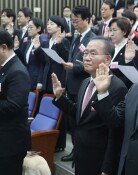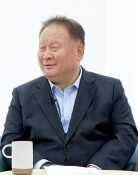<19> Rohs Disparaging Remarks toward the Press
<19> Rohs Disparaging Remarks toward the Press
Posted December. 17, 2007 18:19,
Rohs Endless Cursing of Journalists
Its impossible to count the number of indecent words and expressions Roh has spit out throughout his presidency towards journalists. He dared to personally attack them out of hostility. Few South Koreans define his remarks as sound criticism. Naturally, the journalists hearts fell apart. Rohs men started to copy their boss and to call journalists with various names.
○ Rohs Continuous Blame-Dumping on the Press
In a recent interview with an Internet news company, Roh yet again revealed his hostility toward the press, saying, Former presidents Kim Young-sam and Kim Dae-jung were slain by the press near the end of their terms. I will not leave Cheong Wa Dae [i.e. Korean White House] in a body bag, but on my own feet.
To the dismay of Roh, the vast majority of South Koreans do not agree with his characterization. Most believe the corruption scandals involving the two ex-presidents inner circles and sons forced them into the abyss. Nonetheless, Roh does not seem to believe so.
Roh has intensified his reaction to the criticism from the press with his verbal indecency tactic.
This May, President Roh announced a new anti-free speech measure disguised as the Advanced Media Support System, which earned strong criticism from all quarters in society. Subsequently, at the May 29 cabinet meeting, Roh snapped, saying, Reporters are claiming absurd privileges. We do not hesitate to play by the rules. In a nutshell, if Roh perceives someone is playing hardball with him, he threatens to fight back harder.
Rohs hysterical reactions are worsening. Especially since early this year, hes been bombarding the press with his dirty mouth. He once defined the press as junk food, for instance. He seems to perceive the press as his greatest political enemy.
At the January 3 party at Cheong Wa Dae, Roh alleged, When unchecked, an elite group can pose the greatest threat to society, and that group is the Korean press.
The very next day, he told his national economy team over lunch after a meeting at the Gwacheon Government Complex, The sloppiest works are those done by the press. Reporters bring up allegation after allegation without citing any source, and these words are harming and killing people all over the nation.
Again at the January 16 cabinet meeting, he lashed out at the press, saying, On the top of my agenda is the effort to eradicate the vested, the black connection among them, the back-door deals, and the foul play from society. The press is resisting this most vehemently. Im not sure whether I can achieve the goal in that area.
In the Presidents New Years address to the nation, on January 23 this year, he repeated his typical blame-dumping tactics, saying, I was completely devastated in 2004, when the press launched a scathing attack on my positive remark that we were not faced with an economic crisis; contrary to the diagnoses of the journalists.
○ Im Gonna Teach Them a Big Lesson
The Advanced Media Support System represents the core of Rohs hostility toward the press. Under the new system, all government agencies have shut down the pressrooms at their buildings. From the early days in his presidency, Roh made public his dissatisfaction with the press, defining it as a bullying, dangerous social harm with great power. His men, in turn, put Rohs words into practice. His hostility, however, was revealed long before he took office as president. In 2001 when he was Marine Affairs Minister, he stressed, We need a political leader who has the guts to stand up to and fight against the press.
In February 2002, as president-elect, Roh first confirmed how distorted his view of the press is. He said, Past administrations begged journalists to cover up or downsize articles unfavorable to them. They treated the reporters with free meals, drinks
His distorted view is still flaring up day after day despite his waning presidency. He even told the cabinet at its January 16 meeting, Hunkering down in the pressroom, reporters are distorting the message to the public.
Right after the remarks, the Government Information Agency began to search for better ways to rein in the press, and finally came up with the Advanced Media Support System on March 22, a system under which pressrooms were to be closed.
○ Distorted Loyalty Supporting Rohs Distorted View
Like the boss, like his men! To please their boss, Rohs subordinates began a weird blaming competition among them against the press. They directed all their finger pointing toward the press. Their loyalty, however, has earned criticism even from the ruling party. The ruling party keeps criticizing the unnecessary comments [of the inner circle], which drive away public support from the administration.
Ahn Hee-jeong, a partner of Roh throughout his life, alleged in the May interview with an Internet news company, The conservative press has almost botched up [the Roh administration]. Our supporters have stood up to defend it, and the press does not deserve to criticize them.
Likewise, former Presidential Press Secretary Cho Ki-suk said, The press spells negative magic on whatever President Roh says. She also contends in her recent book that the Dong-A and the Chosun make frames in the morning copies, and the MunHwa Ilbo mass-reproduces their ideas through the frames.
One of the key players in the birth of the advanced control system, Yang Jeong-cheol, the presidential public relations aide, once said, The Dong-A and the Chosun should stop their cursive rituals, which brought him before court on a defamation charge. In August 2007, commenting on the rally of the editors in chief from all over the nation in protest against the new media control, Yang mocked and said, Military regimes framed journalists as spies and even tortured them in the past. We cannot count the numerous events. Where were you guys at that time? I didnt see any of you at those incidents. Now, youve gathered after 48 years for this small matter? Talk about action, huh?
Loyal lieutenants of Roh have been using all the flammable words to spearhead their bosss war against the critical newspapers, reinforcing Rohs distorted view in the process.
[Obsessed with Underdog Mentality, Roh Brands Critical Newspapers as Social Evil]
Rohs hostile view on free speech has a long history.
In 1991 when Weekly Chosun ran an article under the title Human Rights Attorney Roh Moo-hyun, Member of the Millionaires Yacht Club, Roh commenced a civil action seeking 300 million won in damages for defamation.
In May 2001, as adviser to the New Millennium Party, Roh visited the Daewoo Motors Bupyeong plant to negotiate a deal between the government and the union, but the union workers showered him with eggs. Some newspapers, however, did not cover the egg-bombing case. Roh then showed his disappointment in angry, vivid words, saying, We cannot reform our society unless we overhaul the conservative print and broadcast media. We politicians should ally with liberal groups and media companies to cure the social evil.
On the contrary, Roh was the greatest beneficiary of the social evil. Prestigious newspapers and broadcasting companies including the Dong-A had elaborated on his activities and achievements as civil rights activist. We also detailed his activities during the parliamentary hearing on the corruption scandals of the Jeon Doo-hwan administration, and helped him earn a reputation among the citizens. The Dong-A also coined a new term to honor his fighting against regional hegemony, and helped the world know who Roh is.
But Roh took all the special contributions and favors for granted. Despite all the favors, if a newspaper runs an article criticizing him, he puts all the blame on the newspaper.
Rep. Yoo Jong-pil (Democratic Party), who served as Rohs press secretary during his 2002 campaign, later confessed, So obsessed with an underdog mentality and a distorted view of the press, it was extremely hard to assist him.
South Koreans took candidate Roh and fledging President Roh as a naïve politician attacking the press and the media only to muster up supporters. As time goes by, however, his stinging tongue has become a symbol of the Roh Cult that has dominated his entire cabinet and policies.
Intrigued by Rohs psychiatric behavior, scholars have endeavored pathological and psychological approaches to his combative stance on the press.
Yonsei University psychology professor Hwang Sang-min diagnoses Roh as having perspective-taking disorder. Hwang explains, Roh is convinced that whatever he believes to be legitimate should also be legitimate to others. He perceives all differences as a single entity. Thus, its impossible for him to understand the psychological discrepancies between others and himself.
Other scholars point to his lifelong underdog mentality and rebellious personality as the source of his problems. Roh, for example, states in his book, As a boy, my heart was full of hostility and anger. I think I was a little obsessed with inferiority.
Rohs middle school homeroom teacher once wrote on his school report, Smart and analytical boy, but unwilling to reach compromise with classmates and extremely egoistic. Likely to get worse with his uncontrollable behavior. His ultra-ego hinders smooth relationships with his classmates.







